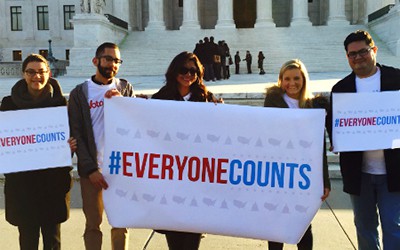Last week, in Evenwel v. Abbott, the US Supreme Court rejected the latest attempt at political gerrymandering aimed at disenfranchising Latino communities in Texas. This attempt has been attributed as the brainchild of the “Project on Fair Representation,” a right-wing group that succeeded in dismantling a key protection against racial discrimination in the Voting Rights Act in the 2013 case Shelby County v. Holder.
In last week’s case, the issue was whether legislative districts should be apportioned and awarded representatives based upon the number of total individuals or based upon the number of eligible voters. If the district is based upon the number of eligible voters that would exclude all ineligible voters from the count. This means that non-citizens (as well as convicted felons whose voting rights have not been restored, among others) would essentially be entitled to no representation. It also means that there would be fewer urban districts, which tend to vote for Democrats, and therefore tend to vote for stronger protections for Latino communities.
The right-wing catch-phrase here is “voter equality” as in each voter is equally represented. The flip-side of this is that there is no “equality of representation,” i.e. individuals who cannot vote lose the right to representation in law-making bodies. The intended effect of this lawsuit was for Republicans to gain power at the expense of large and growing Latino communities in Texas. Last week, the Supreme Court roundly rejected this transparent and odious power grab.

